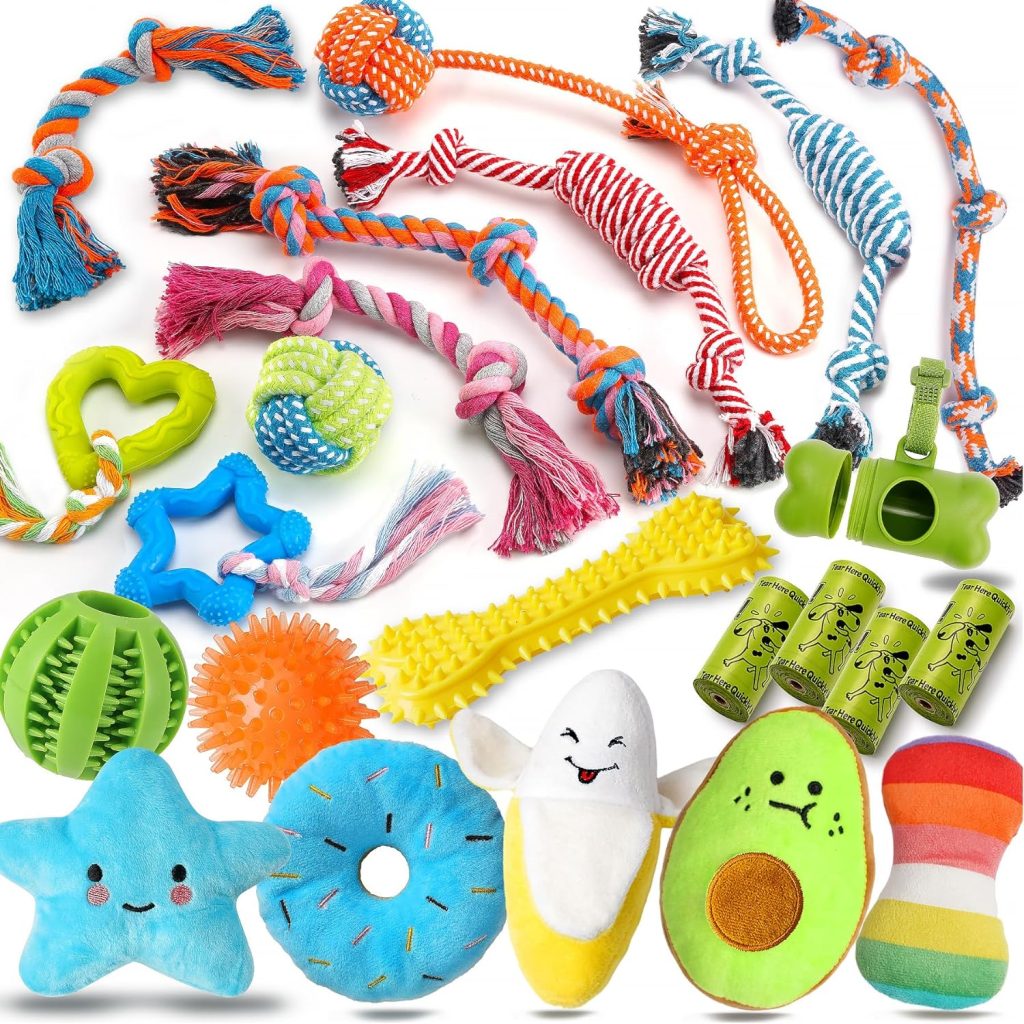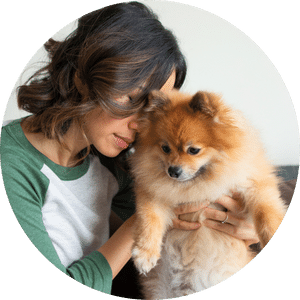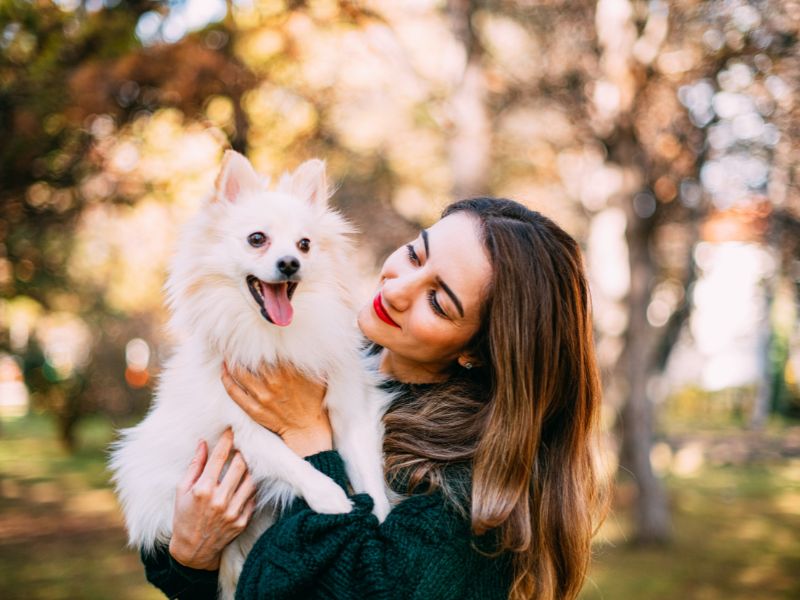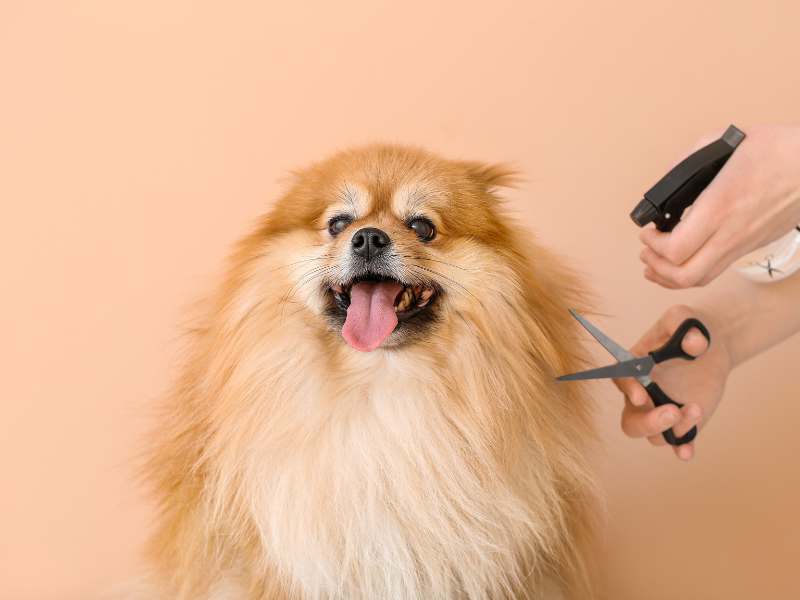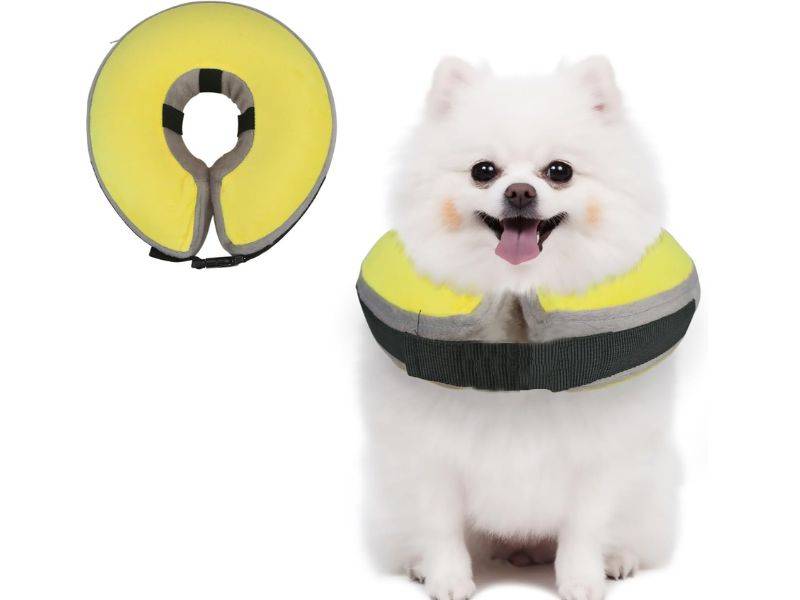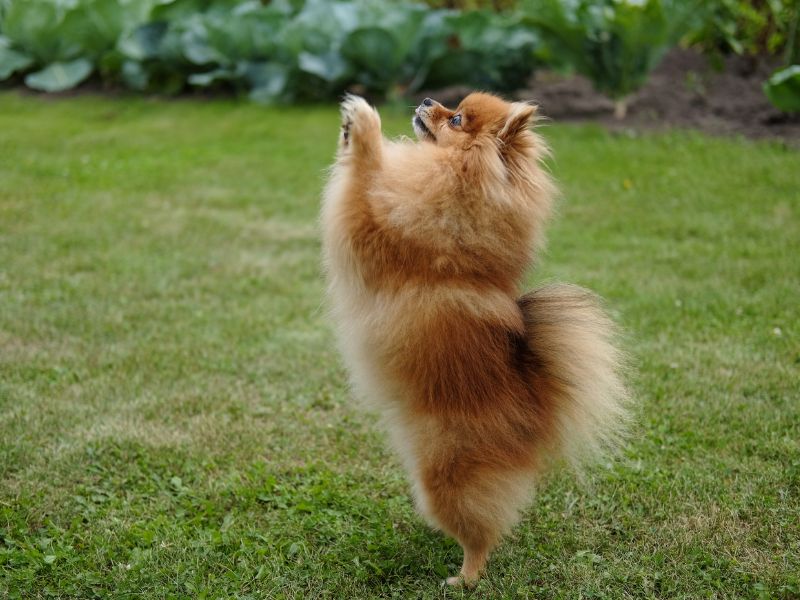
Ever imagine having a small buddy who sits quietly with you, looking innocent? One that doesn’t do embarrassing things when you have friends over?
Well, that’s the Pomeranian – said to be the best-behaved dog around.
Yep, you got that right. But there’s more to it! The Pomeranian might be tiny, but it’s super smart, curious, and really into food. This can make raising one a bit tricky if you’re not ready for it. No worries, though! We know a lot about these cute and playful Pomeranians.

37 Important Tips for Pomeranian Owners
If we knew these simple Pomeranian tips when we got our first one, it would have saved us a bunch of confusion, time, and maybe a headache or two! These tips are from people who really know Pomeranians, and they give you a real look at what it’s like to have one.
We’re not hiding anything. We’re giving you helpful and real info to help you decide if having a Pomeranian is right for you. And guess what? This list will probably be your favorite go-to page for all things Pomeranian!
So, get ready and grab your favorite drink (coffee or something a bit stronger), and let’s dive into the fun world of having a Pomeranian buddy!
1. Discover What Your Pomeranian Requires – in Advance!
It always surprises us how many dog owners are completely unprepared for what to expect when bringing home their new pom pom. It’s not like dogs come with an instruction manual, right?
For instance, the sinking realization that a child gate is absolutely essential to keep your Pomeranian contained. It’s not something you can just pick up when you have a brand-new puppy in the house!
Before bringing your new Pomeranian home, take some time to prepare and think about everything that will be needed in the next few months – believe us, it’ll save you a lot of time and unnecessary stress!
We’ve compiled a list of everything you might need for a Pomeranian (and why) to make life that little bit simpler.
2. Select the Right Name for Your Pomeranian
If you’re not bringing home a new puppy, feel free to skip this tip! However, for those still on the lookout for the perfect name, it’s crucial to choose a name for your Pomeranian that:
- They can respond to quickly
- Is two syllables (so it doesn’t sound like common words)
- Ideally includes the letters D, K, P, or S
Pomeranians tend to get easily distracted and may have a case of ‘selective hearing,’ choosing a suitable name as a super-important tip.
Many people make the error of giving their dogs names that sound like other commonly used words. This not only confuses your Pomeranian but can also lead to significant frustration when it seems like they’re consistently ignoring you – and nobody wants that!
Check out this list of over 350 Weird, Wacky, and Wonderful Names for a Pomeranian to find the perfect fit!
3. Avoid Unintentionally Boosting Pomeranian Barks or Howls
When you bring home your first Pomeranian puppy, you might think their little barks and howls are super cute.
But if you join in and encourage them too much, there’s one big problem: your neighbors won’t like it!
Pomeranians already tend to be loud on their own, and if you make a big deal out of their barking, they’ll think it’s a good thing. So, it’s important to be careful not to let them become a noisy nuisance
4. Crate Train Your Pomeranian From Day One
Getting your Pomeranian used to a cozy spot, like a crate, as soon as they come home is super important if you want to keep them safe – and keep your house (and your peace of mind) in good shape!
Some people start using a crate when it’s almost too late, using it as a way to keep their Pomeranian in check and stop them from wrecking things, without suitable crate training taking place
A lot of Pomeranians end up in crate because they love chewing and messing up stuff around the house. The truth is, Pomeranian puppies usually feel more comfortable in a crate when they’re by themselves, compared to being left alone in a big empty house or room (which makes them feel really lonely).
And here’s the bonus: teaching them to like their crate helps a ton in calming down separation worries and stopping them from causing chaos because they’re anxious.
When it’s done with care and the right way, Pomeranians figure out that their crate is a safe, familiar place where they can relax. This makes life much simpler and less stressful for everyone. And don’t worry, it’s not forever – just until they grow up a bit and can be trusted!
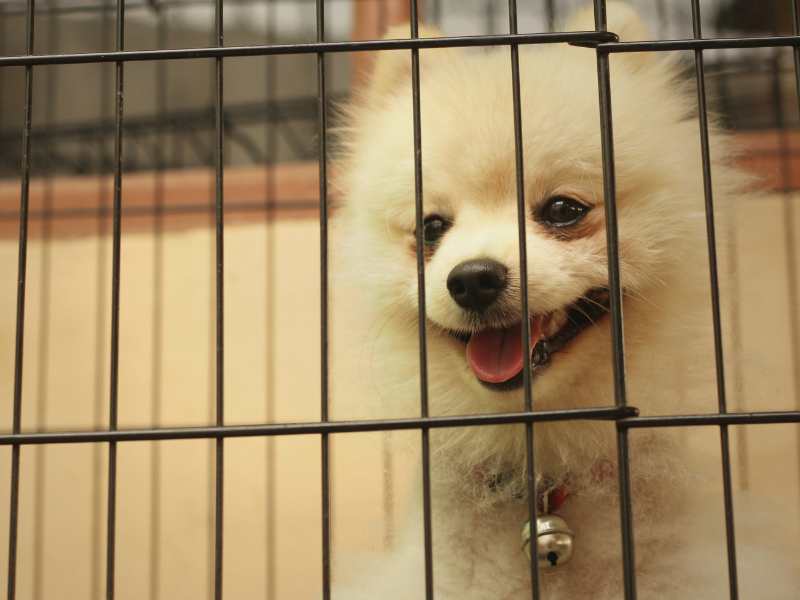
5. Regular Grooming Routine
Taking care of your Pomeranian’s fluffy Luxurious coat is super important! They have two layers of fur, and brushing it a few times a week helps keep it tidy and prevents it from getting tangled and shedding too much. This isn’t just for looks—it’s about keeping your Pomeranian comfy and healthy.
Don’t forget about their teeth! Pomeranians can have dental issues, so brushing their teeth regularly is a must. Use a dog-friendly toothbrush and toothpaste to keep their pearly whites in good shape.
Trimming their nails is also a big deal. Long nails can make them uncomfortable and even affect how they walk. Aim to trim their nails every 2-4 weeks or get help from a vet or groomer if you’re not sure how to do it safely.
These grooming sessions aren’t just for looks—they’re a chance to check for any weird lumps or skin problems. Catching these early helps your Pomeranian stay healthy, and it’s a great time to bond with your pup. So, make grooming a regular part of your routine to keep your Pomeranian happy and healthy!
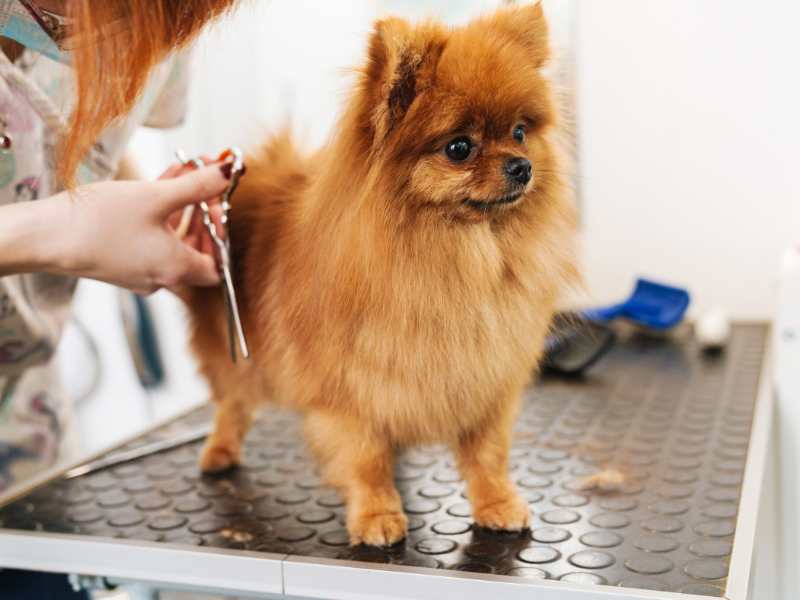
6. Pomeranian-Proof Your Home and Yard
Making your home and yard safe for your Pomeranian should be the top tip on this list. We might need to rearrange things a bit!
If you want a happy, loving relationship with your Pomeranian, you need to make sure your home is Pomeranian-proof. This means helping them avoid getting into trouble and staying on your good side.
Pomeranian puppies are naturally super curious and will try to escape, take things, wreck stuff, and chew on anything they can reach.
Here’s how to set up a Pomeranian-proof space that keeps them (and your things) safe!
7. Understanding and respecting the independent nature of Pomeranians
Pomeranians like to do their own thing, so it’s important to give them some space. Even though they can be very loyal, they also enjoy having time to themselves. Make sure they have a comfy spot where they can relax on their own, like a cozy bed or a quiet corner.
It’s not that they don’t like being with you, but they appreciate having moments when they can explore and be curious by themselves. Taking them for walks or letting them play outside can make them really happy.
Respecting their independence means understanding that they need a balance. They may not always want attention, but they still love spending time with you. Playing together and showing them affection helps build a strong connection.
In a nutshell, respecting a Pomeranian’s independence means letting them have their own space, allowing them to explore, and finding the right mix between them doing their thing and enjoying time with you.
8. Always Have a Supply of Durable Chews!
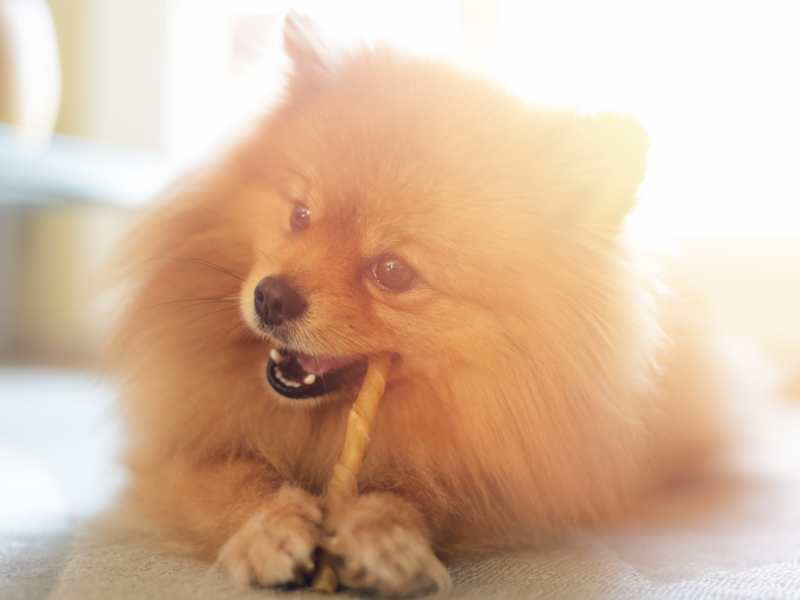
Keeping your Pomeranian entertained with a good quality durable chew is one of the best tips we can give you.
Pomeranians have a tendency to love chewing on things they shouldn’t, so it’s important to provide them with plenty of appropriate options. Plus, you never know when the need arises to keep them entertained at short notice with a chew, such as a last-minute online meeting or a visitor calling out of the blue.
Not only will it keep them busy, but it’ll also help clean and maintain dental hygiene. Here’s our selection of tried and tested 15 Long-Lasting Chews for Pomeranians.
9. Health Check-ups
Make sure to take your Pomeranian to the vet for regular check-ups. These visits help keep an eye on your pom poms’ overall health. The vet will check things like weight, teeth, and heart to make sure everything is okay.
Going to the vet regularly is like a check-up to catch any health problems early. It’s a way to make sure your Pomeranian stays healthy and happy for a long time. The vet will also give them shots to protect against common doggy sicknesses.
During these visits, you can talk to the vet about what your Pomeranian eats. They can help you choose the right food to keep them strong and prevent any issues. Building a good relationship with your vet is important because they can give you advice about keeping your Pomeranian feeling good.
So, taking your Pomeranian to the vet isn’t just for when they’re sick—it’s a way to make sure they stay well and live their best doggy life!
10. Special toy for teeth
When your Pomeranian is growing new teeth, it might make their gums feel uncomfortable. To help them feel better, give them special toys made for teething. These toys are soft and can even be chilled in the fridge for extra soothing. They’re like a puppy pacifier!
Having these teething toys is important because it keeps your Pomeranian from chewing on things they shouldn’t, like your shoes or furniture. It’s a way to help them learn what’s okay to chew and what’s not during this teething time.
Always watch them when they’re playing with these toys, and check the toys regularly to make sure they’re not broken or too small. If a toy looks damaged, replace it so your Pomeranian stays safe.
Giving them teething toys is a simple and caring way to make teething more comfortable for your pup and to keep your things safe from their little teeth.
11. Introduce Variety in Toys
12. Harness Their Lively Character
Make sure to let your Pomeranian’s lively side shine by taking them for walks and playing with them every day. Even though they are small, Pomeranians are full of energy and need a way to let it out for a happy and healthy life.
Daily walks are like adventures for them. They get to sniff around, explore, and see the world. It’s not just good exercise; it’s also a chance for them to be curious and have fun.
Playing together is another way to keep them happy. It could be fetch with a ball, tug-of-war with a toy, or just running around in the yard. This helps them use all that energy in a positive way and makes them feel loved and connected to you.
Remember, even though they’re little, Pomeranians need to move and play every day. It’s good for their body and their mind. So, embrace their lively spirit, and make sure they get the daily walks and playtime they need!
13. Watch for Excessive Barking
Pay attention to when your Pomeranian barks. While it’s good they alert you, try to stop them from barking too much. Teach them when it’s okay to bark and when it’s not needed. This helps them not to bark all the time for no reason.
Think of training like teaching them a language. Use treats or praise when they bark for the right reasons, like when someone’s at the door. This helps them understand when it’s appropriate to make noise and when it’s not.
Sometimes they bark because they’re scared, excited, or want your attention. Find out what makes them bark and use training to help them express themselves the right way without barking too much.
Spending time with your Pomeranian, playing and giving attention, can also stop them from barking just to get noticed. A happy and balanced Pomeranian is less likely to bark too much.
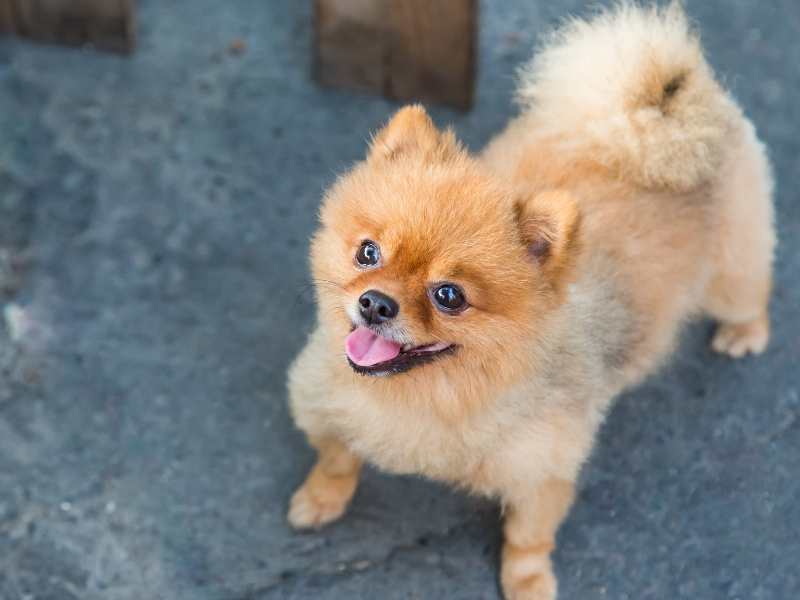
14. Address Attention-Seeking Behavior
When dealing with attention-seeking behavior in Pomeranians, it’s essential to understand that these smart little dogs can use their intelligence to get your attention, even when they’re up to no good. To tackle this, it’s crucial to implement a strategy that reinforces positive behavior while discouraging attention-seeking antics.
Firstly, be proactive in providing positive attention when your Pomeranian behaves well. Offer treats, praise, and affection when they exhibit behaviors you want to encourage. This positive reinforcement helps them associate good behavior with your attention and rewards.
On the flip side, it’s equally important to address attention-seeking behavior by ignoring it. If your Pomeranian is engaging in behaviors to grab your attention negatively, like barking or pawing, withhold your reaction. By not giving attention during these times, you communicate that such actions won’t result in the response they desire.
15. Balanced Nutrition
Make sure your Pomeranian gets the right food that fits their size and age. It’s like picking the right snacks for you! Talk to your vet to figure out the best food plan, thinking about how much they should weigh and if there are any foods they can’t eat.
Imagine it’s like having a menu for your Pomeranian. Some dogs need more food, some need less, and some have special diets. Your vet is like a food expert who can help you choose the right menu for your furry friend.
If your Pomeranian needs to lose or gain weight, your vet can help plan the right meals. It’s a bit like having a coach who helps you stay healthy by eating the right foods. They can also tell you if your Pomeranian has any food allergies or things they shouldn’t eat
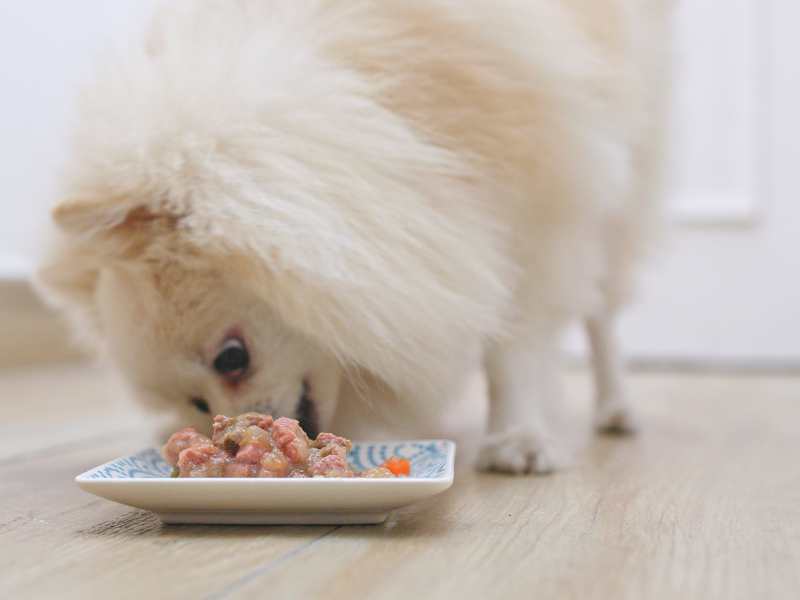
16. Prepare for Lots of Pomeranian Cuddles
Pomeranians might be high-energy dogs, but they absolutely adore naps and cuddles too! In fact, they enjoy them so much that they’ll often claim your couch or bed as their own and resist moving (unless it involves a trip to the kitchen, of course!)
Pomeranians love snuggling up, often tucking their little faces into your elbow to keep their noses warm. They’re known to stay in this cozy position for quite a while, enjoying the warmth before feeling too warm and needing a break.
If given the chance, these spirited pups are more than happy to nap and cuddle with their humans for up to 16 hours a day, making it one of the sweetest aspects of Pomeranians! So, if you have a Pomeranian, get ready for some adorable naptime and cuddle sessions with your pom pom.
17. Prepare for Endless Amounts of Pomeranian Fur
We’re not kidding when we say Pomeranians shed a lot, so get ready to clean up fur often with these little buddies around! You’ll find Pomeranian fur in your meals, on the stove, in your bag – pretty much everywhere! Many Pomeranian owners also avoid wearing black because it shows Pomeranian fur the most. The best way to stay on top of the mess is:
- Weekly grooming with a double-ended bristle brush
- Monthly brushing with a good-quality de-shedding tool
- And if you can justify one, get a self-emptying robot vacuum
The robot vacuum is a complete game-changer for managing pomeranian fur, and one of our top tips!
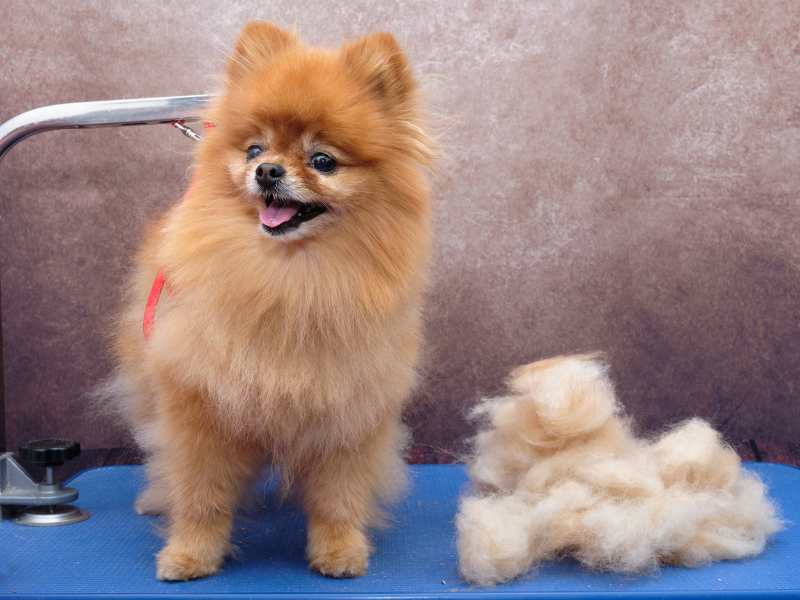
18. Get Pomeranian Trained Asap
Especially when getting a new Pomeranian puppy, it’s crucial to begin training as early as possible – preferably before they reach 18 weeks old.
At this age, Pomeranians are considered juveniles, and their minds are more open to learning, making it easier for them to grasp commands.
If you don’t train your Pomeranian puppy, they are likely to start training themselves – and the results might not be to your liking!
Among the top online dog training courses, we suggest K9TI Training Institute for their effective, force-free methods and comprehensive coverage of various behavioral issues.
Their generous free workshop offers a great preview of what their courses entail, showcasing impressive real-time results.
Check out our complete list of the Top 15 Recommended Training Courses for Dogs.
19. Train Other Humans!
Like training your Pomeranian isn’t enough of a tough task, you’ll also have the responsibility of training the other humans in the household too!
Pomeranians need consistency to learn how to behave appropriately.
If you’re the one doing all of the hard restraint work, only for someone else to come along and ruin it all, then that Pomeranian is going to walk all over you!
Rules, boundaries, command words, feeding schedules – you should all be using the same methods to avoid confusing your Pomeranian and subsequently turning them into a little menace!
Consider the different types of dog training tools and gadgets that’ll help make life a little easier for you.
20. Be Patient and Consistent with Training
One of the most important tips for new Pomeranian owners is to be patient and consistent when training your pup.
Pomeranians are intelligent dogs, but they can also be a little stubborn, so it’s vital that you keep up with the commands and train them consistently.
Using positive reinforcement (rewards) is the best way to train a Pomeranian and will make both your lives much easier in the long run.
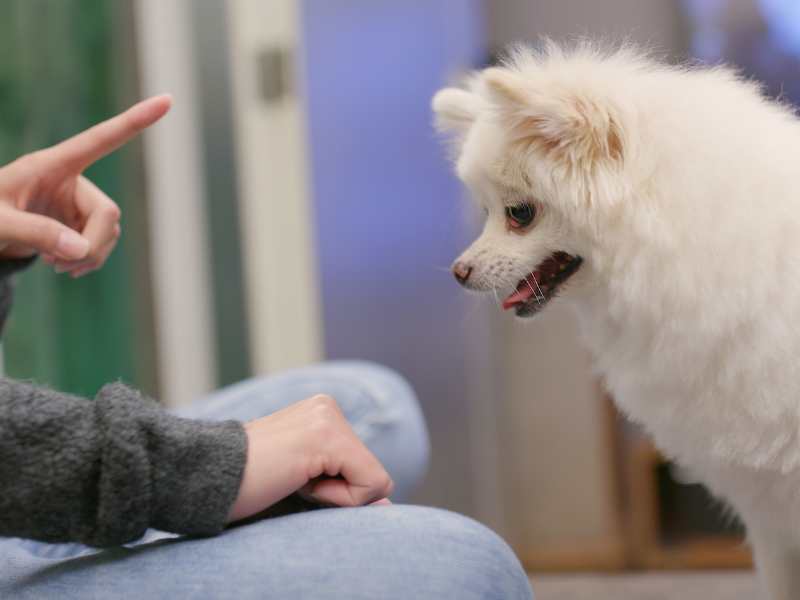
21. Don’t Become a Treat Machine
When training a Pomeranian pup, you’ll be using lots of food treats as a way to reward them for desirable behavior.
However, there will come a point where you must gradually reduce the number of occasions you give treats to your Pomeranian to encourage calmer behavior. If you’re seen as a constant treat provider, Pomeranians may struggle to relax whenever you get up and move around the home, thinking they’ve earned a treat just for existing! It can lead them to follow you around like your shadow, always on high alert.
This can also make them prone to separation anxiety if this ‘treat provider’ leaves them alone at home, as your absence becomes more noticeable.
Constantly giving Pomeranians treats throughout the day can escalate excitement to the point of stress. Instead, cut back on treats and gradually train your Pomeranian to be a little more independent.
22. Monitor Weight and Exercise
Make sure to check your Pomeranian’s weight regularly. If they become too heavy, it can cause health problems. To keep them healthy, make sure they eat the right amount and get enough exercise to stay at a good weight.
Imagine it like this: if they eat too much or don’t move around enough, it’s like people eating too many cookies and not going for walks. This can make them unhealthy.
So, watch how much your Pomeranian eats, and make sure they get playtime and walks. This helps them stay strong and happy. If you’re ever unsure about their weight or how much they should eat, ask your vet for advice. Keeping them at a healthy weight is a great way to make sure your Pomeranian stays fit and lives a long, happy life.
23. Be Mindful of Noises
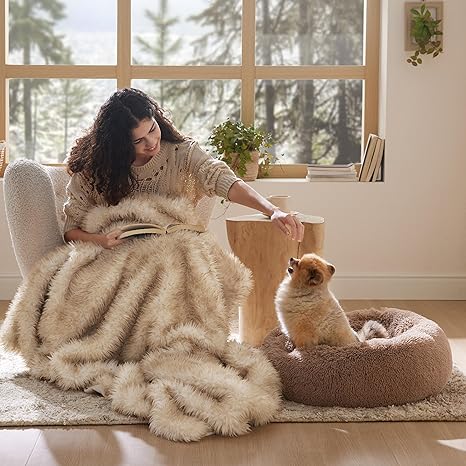
Be mindful of loud sounds around your Pomeranian. Things like storms or fireworks might make them feel scared. To help, create a quiet and cozy space where they can feel safe during these noisy times.
Imagine it like this: when it’s really loud outside, it’s like when we cover our ears. Pomeranians might feel the same way and get worried. Making a calm space with a comfy bed or blanket can help them feel protected.
You can also stay close and comfort them with gentle touches or soothing words. It’s like when someone you love gives you a hug when you’re feeling scared. This makes your Pomeranian feel better during the noisy moments.
Being mindful of noises and helping them feel safe is a great way to show your Pomeranian that you care. It’s like being a friend when they need it the most.
24. Mind Their Size
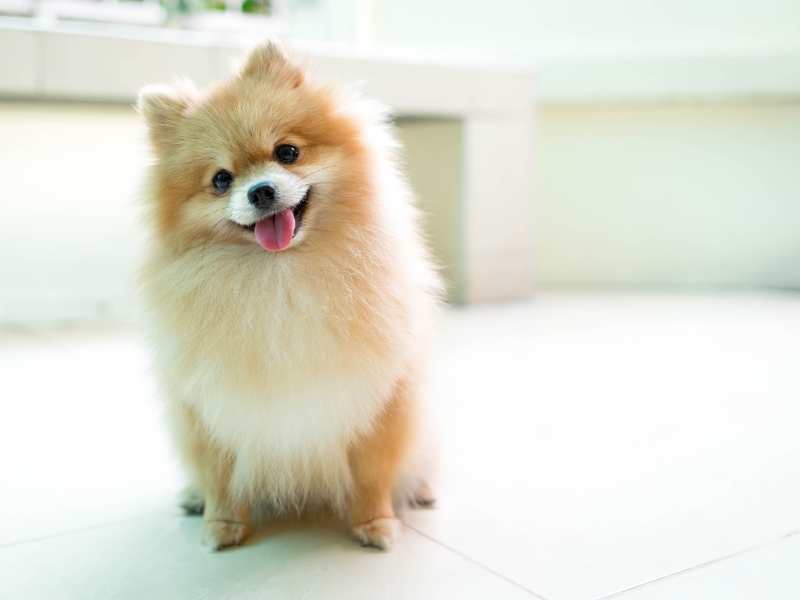
Be careful when you handle and play with your Pomeranian because they are small. They can get hurt if someone accidentally steps on them or plays too rough. So, it’s important to be gentle and cautious.
Think of it like holding a delicate toy. Pomeranians are tiny, and their bones can be fragile. It’s a bit like if you have a favorite toy that you handle with care so it doesn’t break.
Make sure to teach kids and guests about being gentle with your Pomeranian. Explain that they’re like little buddies that need soft touches and careful play. It’s a bit like showing friends how to play nicely with your favorite toys.
25. Make Sure Your Pomeranian Works for Their Treats
Besides providing your Pomeranian with lots of physical playtime, engaging them in mental stimulation games is a fantastic way to make your Pomeranian earn their treats.
From their point of view, having a ‘job’ to do gives them a sense of purpose and leads to much happier and more satisfied Pomeranians.
There are so many different ways to keep Pomeranians occupied and entertained at home, making it simple to find activities that will challenge them mentally for hours.
Given their strong food drive and excellent sense of smell, they’re likely to stay engaged as long as you’re willing!
As experienced Pomeranian owners, here are a few examples of our favorite ways to keep them busy:
- LickiMat with frozen yogurt
- Hide treats around the house while they’re in the yard
- Kong with peanut butter or banana
- Treat Dispenser
- Yak Milk Chews (very long-lasting)
- Snuffle Mat sprinkled with kibble
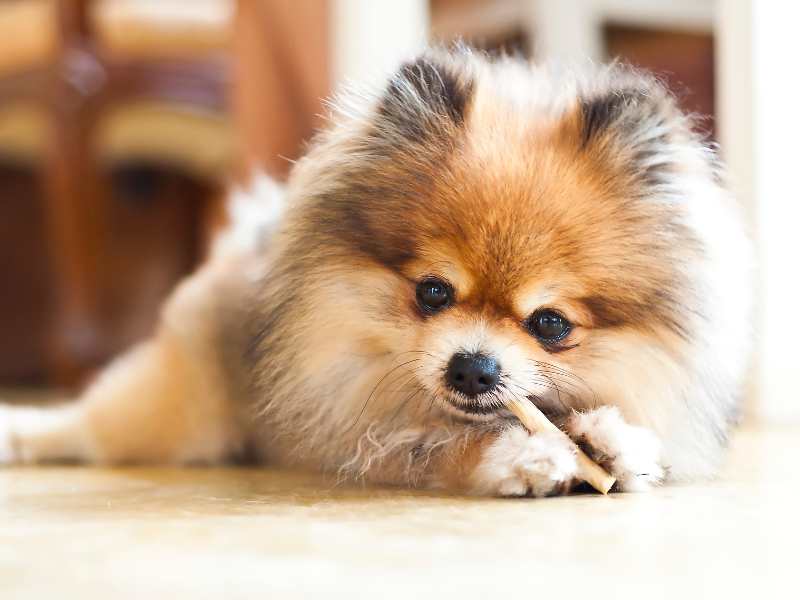
26. Have a High-Reward Treat Available
Having irresistible treats on hand is the top tip for Pomeranian owners, especially in situations where you need their full focus.
This is especially true when they’re off the leash or when you want them to be extra well-behaved for a specific reason.
From the very first time we used it, we could tell it was unlike any other treat we’d given our Pomeranians. The strong smell of liver makes them go wild, and they’ll come running whenever they catch a whiff.
27. Get Pomeranians used to Eating Vegetables As Snacks
Getting your Pomeranian used to munching on veggies as snacks can be really helpful in preventing a bunch of issues.
Firstly, using veggies that are safe for them to eat can stop Pomeranians, who are always on the lookout for food, from putting on too much weight. Swapping out high-calorie treats for this healthier option can also keep them feeling satisfied for a longer time.
Plus, they get lots of good stuff from eating fresh veggies, like:
1. Healthier Skin
2. Shinier Coat
3. Cleaner Teeth (especially if they’re raw)
4. A Healthier Digestive System
5. Physical and Mental Exercise
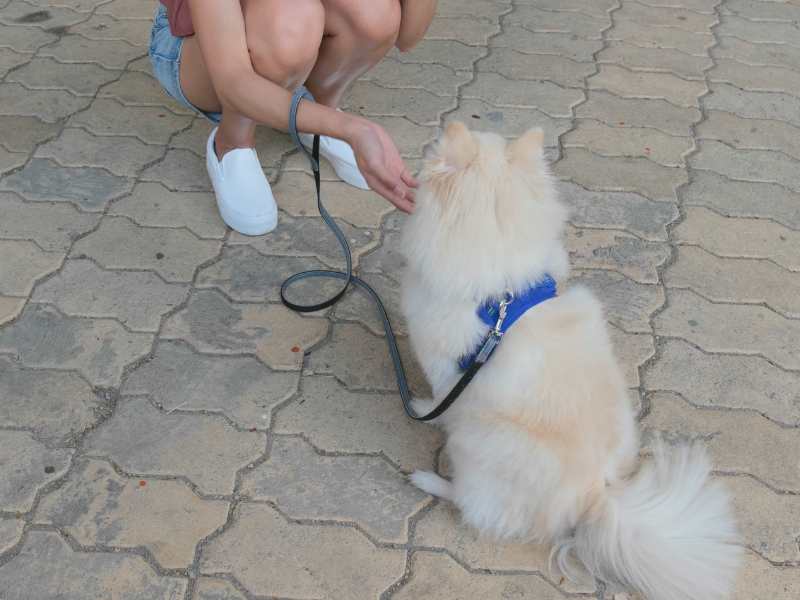
28. Train Pomeranians Off-Leash Early On
If you’re determined to have a Pomeranian that you can walk without a leash, starting training from a young age will make your life a lot easier.
Once a puppy has gotten its important vaccinations (usually around 12 weeks old), take them for walks in enclosed parks or areas where they can’t run off.
At this age, their noses aren’t as strong as they will be at six months old, so they’re more likely to stay close to you, and it’s easier to catch up with them too!
Teaching them to walk without a leash close to you (and with the promise of some treat) will help shape their walking habits for the future.
29. Don’t Let Pomeranians Run Off-Leash Everywhere
While you’re in the process of training a Pomeranian puppy, and until they consistently show good behavior when walking without a leash, it’s best to avoid letting them roam freely in public areas, especially near busy traffic.
Pomeranians are known for wandering off easily because they get distracted by all the interesting smells around them, and they’ve got a really strong nose!
Especially when there’s food involved, no amount of training or calling them back usually works.
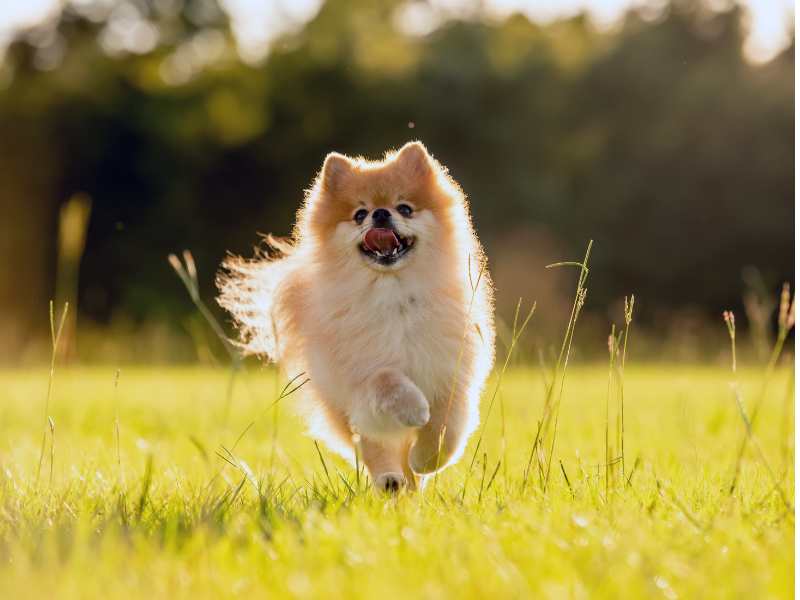
30. Prepare for ‘The Terrible Twos!’
Not all dogs experience the Terrible Twos, but if you have a Pomeranian during this phase, be prepared for a bit of a challenge.
Pomeranians naturally want to test their limits and figure out who’s in charge, and the Terrible Twos is usually when they start doing this more seriously.
Setting rules and limits from the start is important because training them when they’re older can be tough.
Tips for dealing with the Terrible Twos in Pomeranians:
- Stay consistent with rules and training.
- Reward good behavior as much as you can.
- Give them lots of exercise, mental games, and chew toys to keep them occupied.
- Try not to get frustrated; it’s just a phase they’ll grow out of soon!
Even if it seems like they’ve forgotten or ignored all their training, we promise they’ll remember and go back to it soon enough.
31. Rotate Their Toys
This small Pomeranian tip is a real winner, and one we wish we’d discovered much earlier!
Switching up a Pomeranian’s toys can help keep them engaged, especially with things that aren’t edible.
Pomeranians can get bored quickly with toys that they can’t eat or completely destroy.
Rotating the toys makes each one seem more special, especially if you make a big deal out of revealing it to them again!
33. Don’t Leave Your Pomeranian Alone for Too Long
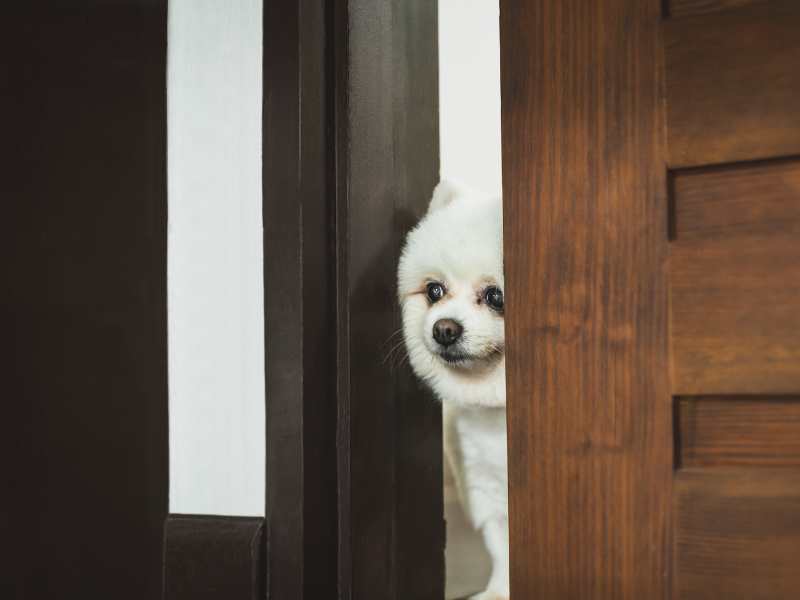
This is true for many dogs, but it’s especially crucial for Pomeranians.
Pomeranians are a lively breed and extremely social animals that don’t handle being alone for long periods very well.
When left alone, Pomeranians can develop destructive behaviors as a way to release their energy and cope with stress. This can leave owners feeling hopeless and sometimes even thinking about giving up on their furry friends.
If you’re going to be away for more than 4 hours, consider hiring a dog walker to take them on a long walk. This not only burns off excess energy but also breaks up their day, making it more manageable for them.
33. Practice Separation
One of the top tips for avoiding separation anxiety in Pomeranians is to start working on it when they’re still young.
As mentioned, Pomeranians are highly social animals that love being around others.
By gradually introducing short periods of alone time, you’ll help them become accustomed to it and lower the risk of them developing serious anxiety issues as they grow older.
Begin with just a few minutes and slowly increase the duration as they become more comfortable.
Here’s a comprehensive guide on Preventing Separation Anxiety in Pomeranians.
34. Avoid Feeding Pomeranians from the Table

Alright, this Pomeranian tip is tougher than it seems, especially with those adorable puppy eyes looking at you, so be ready!
If you give your Pomeranian food from the table during or right after your own meal, get ready for them to start showing these behaviors:
1. Demanding barking
2. Annoying and persistent whining
3. Drooling all over the floor
4. Jumping up at you or the table (with drool on your legs)
5. Expecting to be fed whenever you eat, snack, or pick up any food
6. And all of the above behaviors times 10 when you have guests over for dinner
We won’t lie; we sometimes break this rule on special occasions. But we can confirm that when we do, it awakens the little mischief-maker in them, and they’ll show these behaviors for the next day or so until they realize we’re back to the usual routine!
35. Socialize Your Pomeranian Early On
Ensuring your Pomeranian gets socialized early is crucial for their growth into a well-rounded dog.
This isn’t just about meeting other dogs and people; it’s also about learning how to behave around them.
Pomeranians can be quite lively as puppies, and sometimes, they understand boundaries best when corrected by another dog.
Whenever you can, arrange for your Pomeranian puppy to meet with another friend or family member’s dog in a controlled setting where everyone is familiar with each dog’s temperament.
36. Get Pomeranians Used to Being Handled
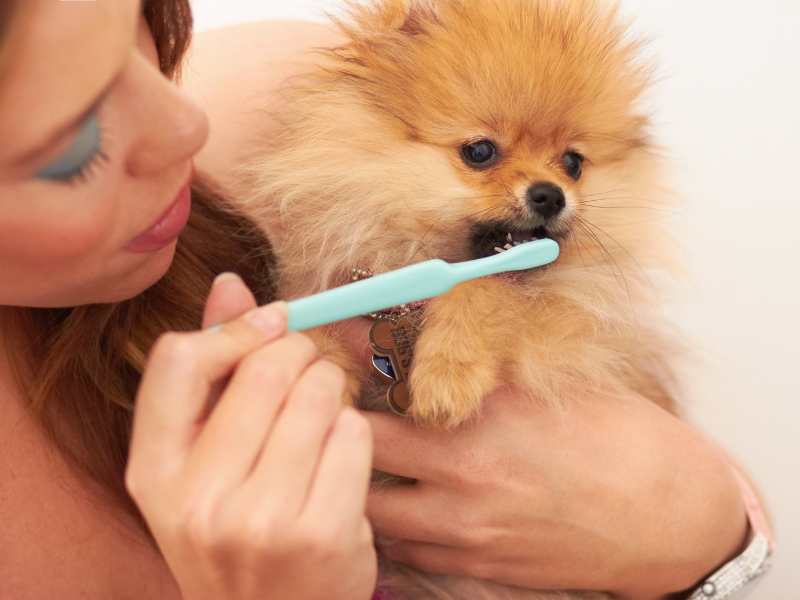
Helping them get used to being handled from a young age is one of the top tips for Pomeranians.
At the very least, they’re going to deal with ear infections, require regular nail clipping and grooming, and at some point, you might need to give them oral medication.
When your Pomeranian is comfortable with being closely handled and trusts you not to hurt them, it makes life (and visits to the vet) much smoother!
And here’s a bonus: Pomeranians are incredibly forgiving, especially if any poking or prodding is quickly followed by a treat that makes them drool!
37. Consider a Buddy for your Pomeranians
It’s a well-known fact among owners that their Pomeranians fare much better when they have one or more fellow Pomeranians (or dogs) around.
This is especially true when it comes to helping your Pomeranian become less reliant on you, thus reducing the likelihood of separation anxiety and other common issues in the Pomeranian breed.
And here’s the bonus: having two Pomeranians doesn’t necessarily mean ‘Double the Trouble!’
Watching them endlessly entertain each other, engage in playful antics, and run around the yard does wonders for burning off all that excess energy. It can also contribute to enhancing their overall health and well-being, benefiting you as well!
READ: 14 Dogs That Do (& Don’t) Make a Great Match for a Pomeranian
Wrapping Up Our Top-Tips for Pomeranian Owners
Being a Pomeranian owner sets you apart from the average dog owner. They’re among the most affectionate and amusing dog breeds, but they also come with their unique set of challenges.
Their high intelligence, paired with a bit of stubbornness, means they might test your patience quite often.
Raising one of these social creatures requires a little extra effort, understanding, and love – but the rewards are definitely worth it!
We hope these top tips for Pomeranian owners make life smoother for you and your furry friend. If you have any questions or tips of your own, feel free to share them in the comments below!
Happy Pomeranian owning!
Looking for a dose of Pomeranian giggles, expert advice, and a community that shares your passion? Our newsletter is the place to be – sign up while you’re here!

